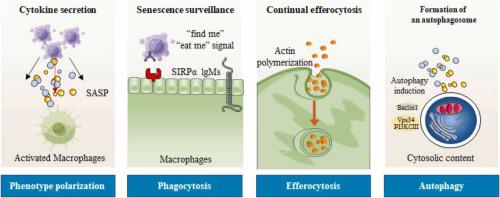The International Journal of Biochemistry & Cell Biology ( IF 4 ) Pub Date : 2023-10-20 , DOI: 10.1016/j.biocel.2023.106479 Hongkang Zhu 1 , Fanglin Shen 2 , Tingting Liao 1 , He Qian 1 , Yu Liu 3

|
Ageing decreases the function of the immune system and increases susceptibility to some chronic, infectious, and autoimmune diseases. Senescence cells, which produce senescence-associated secretory phenotypes (SASPs), can activate the innate and adaptive immune responses. Macrophages are among the most abundant innate immune cell types in senescent microenvironments. Senescence-associated macrophages, recruited by SASPs, play a vital role in establishing the essential microenvironments for maintaining tissue homeostasis. However, it's important to note that these senescence-associated macrophages can also influence senescent processes, either by enhancing or impeding the functions of tissue-resident senescent cells. In this discussion, we describe the potential targets of immunosenescence and shed light on the probable mechanisms by which macrophages influence cellular senescence. Furthermore, we analyze their dual function in both clearing senescent cells and modulating age-related diseases. This multifaceted influence operates through processes including heightened inflammation, phagocytosis, efferocytosis, and autophagy. Given the potential off-target effects and immune evasion mechanisms associated with traditional anti-ageing strategies (senolytics and senomorphics), ‘resetting’ immune system tolerance or targeting senescence-related macrophage functions (i.e., phagocytotic capacity and immunosurveillance) will inform treatment of age-related diseases. Therefore, we review recent advances in the use of macrophage therapeutics to treat ageing and age-associated disorders, and outline the key gaps in this field.
中文翻译:

免疫衰老和巨噬细胞:从基础到治疗
衰老会降低免疫系统的功能,并增加对某些慢性、传染性和自身免疫性疾病的易感性。衰老细胞产生衰老相关分泌表型(SASP),可以激活先天性和适应性免疫反应。巨噬细胞是衰老微环境中最丰富的先天免疫细胞类型之一。由 SASP 招募的衰老相关巨噬细胞在建立维持组织稳态的重要微环境中发挥着至关重要的作用。然而,值得注意的是,这些与衰老相关的巨噬细胞也可以通过增强或阻碍组织驻留衰老细胞的功能来影响衰老过程。在本次讨论中,我们描述了免疫衰老的潜在靶标,并阐明了巨噬细胞影响细胞衰老的可能机制。此外,我们分析了它们在清除衰老细胞和调节与年龄相关的疾病方面的双重功能。这种多方面的影响通过增强炎症、吞噬作用、胞吞作用和自噬等过程发挥作用。鉴于与传统抗衰老策略(senolytics和senomorphics)相关的潜在脱靶效应和免疫逃避机制,“重置”免疫系统耐受性或针对衰老相关巨噬细胞功能(即吞噬能力和免疫监视)将为年龄治疗提供信息相关疾病。因此,我们回顾了使用巨噬细胞疗法治疗衰老和年龄相关疾病的最新进展,并概述了该领域的关键差距。



























 京公网安备 11010802027423号
京公网安备 11010802027423号